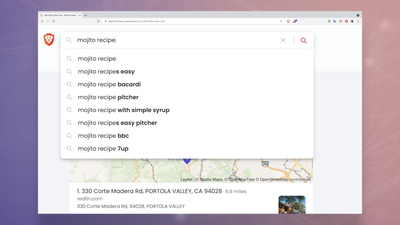Brave, the browser which has gained momentum and popularity in recent years, is taking another leap forward in its quest to offer users a more private and secure internet experience. Starting today, Brave browser users will have access to Brave Search in beta, a completely new search engine that offers "unmatched privacy."
Brave Search was announced last March, and since its announcement, it's been tested by more than 100,000 users. Brave, which prides itself on being a "browser reimagined," recently surpassed 32 million monthly active users and is hoping that Brave Search will further its role in the browser market.
Brave Search beta is available to all Brave browser users on iOS, Android, and desktop starting today. At first, users will need to manually select Brave Search as their search engine option, alongside other choices such as Google and Bing. However, Brave Search will become the default and standard search engine for the Brave browser later this year.
Unlike Google and others, Brave Search doesn't track users, their searches, or clicks. Instead, Brave Search "puts users first, and fully in control of their online experience." The "completely independent" search engine also promises full transparency, with "no secret methods or algorithms for bias results," and soon will roll out "community-curated open ranking models to ensure diversity and prevent algorithmic biases" and censorship.
Brendan Eich, CEO and co-founder of Brave, says the new search engine is the "real alternative" to Big Tech, such as Google, and that it offers a new way for users to securely and privately browse the web without the worry of their privacy.
Unlike older search engines that track and profile users, and newer search engines that are mostly a skin on older engines and don't have their own indexes, Brave Search offers a new way to get relevant results with a community-powered index, while guaranteeing privacy. Brave Search fills a clear void in the market today as millions of people have lost trust in the surveillance economy and actively seek solutions to be in control of their data.
One major upside for users using Brave Search, currently still in beta, is its ad-free experience. When the search engine exits beta, Brave is pledging to offer users options for an ad-free search experience and an "ad-supported free" experience later. The company also said it would "explore bringing private ads with BAT revenue share to search," as it's done for Brave Browser users.

Brave relies on its own index for the web, rather than relying on Google Search and Microsoft's Bing. To do this, Brave is relying on "anonymized contributions from the community to improve and refine results."
In order to present a true independent alternative to big tech, Brave decided to build its own index rather than rent it from Google or Microsoft, as other smaller search engines are currently doing. Brave Search includes anonymized contributions from the community to improve and refine results.
At launch, Brave's index will still struggle to meet the levels of Google and others with search queries such as image search. Until Brave's index can expand, it will rely on using third-party APIs. Brave Search is also introducing an "independence metric" that will inform users on the independence of their search results to ensure no bias in the index or algorithm.
Brave Search is also introducing the industry's first search independence metric, displaying the ratio of results coming exclusively from Brave's index. It is derived privately using the user's browser as we do not build user profiles. Users can check this aggregate metric to verify the independence of their results and see how results are powered by our own index, or if third-parties are being used for long tail results while we are still in the process of building our index.
Brave Search in beta is available starting today for Brave browsers on iOS, Android, and the desktop. It will also be available to non-Brave browser users at search.brave.com






















